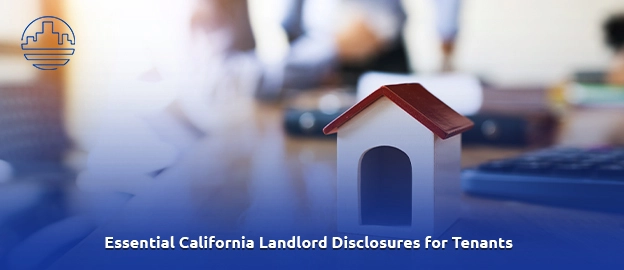
-
1.
What Are the Mandatory Real Estate Disclosures in California
- 1.1. 1. Registered Sex Offenders Database
- 1.2. 2. Information on Bed Bugs
- 1.3. 3. Landlord Contact Information
- 1.4. 4. Lead-Based Paint Information
- 1.5. 5. Existence of Toxic Mold
- 1.6. 6. Methamphetamine or Fentanyl Contamination
- 1.7. 7. Death on the Property
- 1.8. 8. Notice of Pest Control
- 1.9. 9. Demolition Plans
- 1.10. 10. Flood Hazard Area
- 1.11. 11. No Smoking Policy
- 1.12. 12. Shared Utilities
- 1.13. 13. Proximity to Former Military Training Grounds
- 1.14. 14. Unit in a Condominium Conversion Project
- 2. Conclusion
California law requires landlords to include specific disclosures in every lease agreement. Some disclosures, such as lead-based paint or mold, apply to specific properties, while others, like information on registered sex offenders or bed bug prevention, should be included in all agreements. By providing accurate disclosures, landlords ensure legal compliance and build trust with tenants through transparency about the property and surrounding area. Meeting these obligations helps avoid fines and potential legal issues while creating a positive renting experience.
What Are the Mandatory Real Estate Disclosures in California
Landlords in California must provide tenants with the following disclosures, typically in writing at the beginning of the tenancy:
1. Registered Sex Offenders Database
Landlords should inform prospective tenants about California’s registered sex offender database, which provides public access to the names and addresses of registered offenders. Importantly, landlords are not required to notify tenants about nearby offenders. Instead, they need to ensure tenants are aware of the database’s existence.
To meet this requirement, landlords can include the following language in rental agreements:
“Notice: Pursuant to Section 290.46 of the Penal Code, information about specified registered sex offenders is available to the public via an Internet Web site maintained by the Department of Justice. Depending on an offender’s criminal history, this information will include either the offender’s address or the community and zip code where they live.”
2. Information on Bed Bugs
California landlords should clearly inform tenants about bed bugs in all lease or rental agreements. It includes details on their appearance, behavior when they typically show up, and tips on preventing and treating infestations. Tenants should also be informed about promptly reporting suspected infestations to the landlord.
3. Landlord Contact Information
California landlords are required to share their full name, phone number, and address with tenants in all new leases or upon renewal. They should also include payment instructions and provide updated contact details if ownership or management changes. Some disclosures are only necessary if relevant to the property’s age or condition.
4. Lead-Based Paint Information
For properties built before 1978, landlords should warn tenants about the potential hazards of lead-based paint and provide an informational handout explaining the risks.
5. Existence of Toxic Mold
Suppose toxic mold is present in a rental unit. In that case, landlords must notify tenants in writing and provide a consumer handbook on the health risks associated with mold, as issued by the State Department of Health Services.
6. Methamphetamine or Fentanyl Contamination
Landlords should inform tenants if a property was used as a drug lab requiring remediation. They must provide a copy of the remediation order, which tenants must sign and acknowledge.
7. Death on the Property
Landlords should disclose if a death occurred on the property within the past three years without misrepresenting the cause of death unless it involved HIV/AIDS.
8. Notice of Pest Control
Landlords should provide tenants with pest control company notices detailing the type of pests treated, the pesticides used, the active ingredients, and the treatment frequency.
9. Demolition Plans
Before accepting deposits or fees, landlords should notify tenants of any permit application for demolition of the rental unit.
10. Flood Hazard Area
If the property is in a flood zone, landlords should inform tenants and direct them to the Office of Emergency Services website for more information.
11. No Smoking Policy
If smoking is restricted or prohibited on the property, landlords should specify these areas in the lease, especially for agreements signed after January 1, 2012.
Landlords should inform tenants if utility meters are shared with other units and outline how the bills will be divided.
13. Proximity to Former Military Training Grounds
Landlords should notify tenants in writing if the rental is within one mile of a former military training site with possible explosives.
14. Unit in a Condominium Conversion Project
Landlords should disclose if a building is being converted into individual condominium units for sale.
Conclusion
Understanding and complying with California’s landlord disclosure requirements is essential for maintaining transparency and protecting both landlords and tenants. Landlords can build trust and foster positive tenant relationships by providing accurate and timely information on issues like bed bugs, lead-based paint, and other potential property hazards. Beach Front Property Management ensures full compliance with these legal obligations, helping landlords meet their responsibilities while safeguarding tenant rights. With their expertise in property management, Beach Front simplifies the disclosure process, keeping landlords informed of the latest regulations and providing tenants with clear, essential information. Partnering with Beach Front Property Management allows landlords to focus on maintaining quality properties while ensuring legal compliance and tenant satisfaction.
Learn more about how we can help. Customized solutions for large portfolios!
